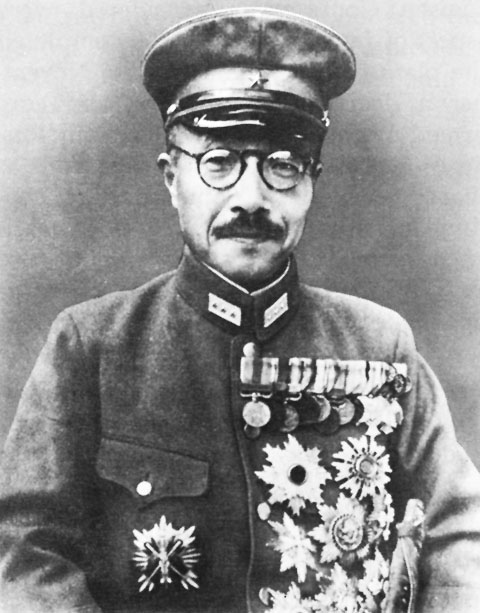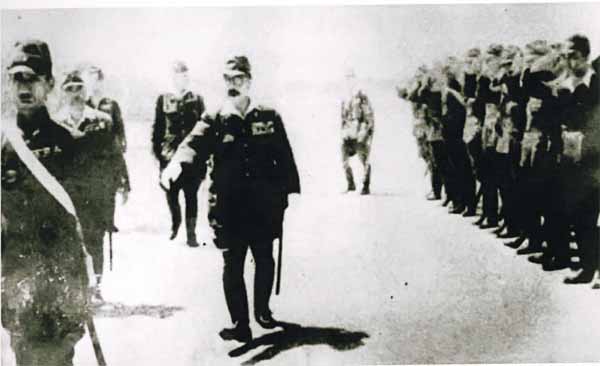 |
| Tojo Hideki |
With his bald, bullet-shaped head and large eyeglasses, Hideki Tojo was a definitive image of Japanese militarism writ in human form. But to many of his colleagues in Japan Hideki Tojo was a detail-obsessed, jumped-up filing clerk who led Japan in its largest and bloodiest war without any strategic vision.
Hideki Tojo was born on December 30, 1884, the son of a career soldier who rose to the rank of general. Short-sighted and short-built, young Tojo entered military school at age 15, showing no exceptional abilities except one for tackling hard work right away and with a driving purpose.
In 1904 newly commissioned 2d Lt. Tojo was sent to Manchuria, arriving just too late to see battle in the Sino-Japanese War. He spent two dull years on garrison duty in Manchuria. In 1909 he married Katsu Ito, a 19-year-old student at a Kyushu women's college, who was educated. They were a love match. They had seven children.
  |
Tojo served in staff jobs, including with the Japanese intervention in Siberia, before being posted to Switzerland and then Germany as a military attaché, where he admired German toughness in the face of defeat. En route home in 1922, Tojo went through the United States and drew a different conclusion from this brief journey: Americans lacked the spiritual strength of the Japanese.
Hot tempered and with close-cropped hair, Tojo was known to his pals as Kamisori, or "Razor." He worked long hours on his paperwork. Ferocious in discipline, he showed a softer side by providing his men with money when they retired to civilian life.
Tojo rose steadily, if not spectacularly, through the Japanese army. In 1933 he was assigned to head the general affairs bureau of the war office, the army's public relations unit. His message repeated his own beliefs: With Russia, China, and the United States as enemies, Japan had to be on its guard. Tojo got his general's star in early 1935.
In late 1935 he got his second star and was given command of the Kwantung Army's military police, or Kempei Tai
In 1937 Tojo was promoted to lieutenant general and appointed chief of staff of the Kwantung Army. When the Japanese invaded China, Tojo led Japanese troops on a drive that outflanked Beijing (Peking) and resulted in the seizure of Inner Mongolia.
It was the only time he commanded troops in battle. He then returned to the Kwantung Army to build up Manchuria's defenses against the Soviet invasion that Japan feared. Tojo was appointed deuputy war minister. Japan was now on the warpath, driving bloody fists deep into China, blasting cities, massacring civilians, and attacking U.S. and British ships on the Yangzi (Yangtze) River.
 |
| General Hideki Tōjō, who is also the Prime Minister of Japan inspecting an airfield in Kuching, while soldiers giving a salute |
Minister of War
In 1940, when Prince Konoye became prime minister, Tojo was appointed minister of war. That September he ordered Japanese troops into French Indochina, then wrote new regulations for the army that stressed Bushido ferocity, and purged the army's pro-British and United States officers, replacing them with his own supporters.
As Japanese-U.S. negotiations over peace in the Pacific collapsed, so did the Konoye government. As the only man who had the all-important army's loyalty and the only one capable of leading Japan through the war he was planning to launch against the United States and Britain, Tojo was appointed prime minister on October 17, 1941.
His contempt for the United States and Britain manifested itself in the attack on Pearl Harbor. As Japan's war leader, Tojo took everything on himself in the best clerkish style. He also appointed himself minister of the interior, foreign affairs, education, commerce, industry, and munitions and chief of the army general staff. He appointed his Kwantung Army cronies as deputies, assuring loyalty if not efficiency.
   |
Tojo's management style stressed details, memoranda, and paperwork. He cleared his desk by the end of each day, worked late, slept only four hours, and worried over small details—even peering into garbage bins on Tokyo streets to see how food rationing was working out.
Banished Rivals
Tojo also spent a lot of time battling his personal enemies. Many of those were of his own creation—officers and subordinates who brought him bad news. He banished potential rivals, like Lieutenant General Tomoyuki Yamashita
As the war continued, Tojo concentrated power in his own hands, granting large contracts to cronies and relying on his secret police to maintain order and eliminate dissidents.
Yet for all his power, Tojo was not the absolute dictator Adolf Hitler was. As Japan suffered defeat after defeat, his position became precarious. By early 1944 he was jailing rightwing opponents. His roof collapsed when the United States invaded the Marianas, conquered the islands, and defeated the Imperial Navy at the Battle of the Philippine Sea
Tojo kept this news from his citizens, but he could not keep it from his government colleagues. Saipan, coming after the first B-29 raids on Japan, and the British victory at Kohima in Burma, were the final straw.
Tojo's opponents now included members of the general staff, admirals, and the imperial privy council. They forced him to resign in July 1944, replacing him with General Koiso Kuniaki
Not invited to serve on the imperial privy council, Tojo returned to his home. He emerged from obscurity on February 28, 1945, at the request of the emperor, to assess the increasingly grim military situation.
True to form, Tojo insisted that despite the numbers, Japan's chances were better than 50-50. Events proved him wrong. After a failed suicide attempt, Tojo became the only head of an Axis government to stand trial before the International Military Tribunal for the Far East
On May 3, 1946, Tojo stood before the tribunal, determined to protect the emperor from any blame in the war and refuting the accusations of waging aggressive war, torturing and mistreating POWs, and murdering civilians with a 250-page deposition, which blamed the United States and Britain for the war, claiming the attacks on China, French Indochina, and Pearl Harbor were all self-defense, and showing no remorse for the millions of dead and maimed—only for losing the war. That was his fault, not the emperor's. Tojo called no witnesses.